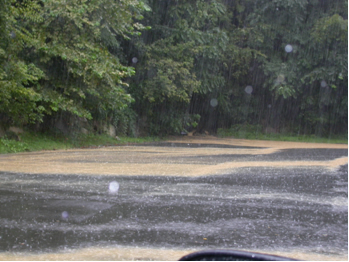Patrick Brady, P.E. Stormwater Manangement Officer Office Phone - (845) 429-2200 or (845) 429-5715 Office Fax - (845) 429-4701 E-mail – pbrady@jrsb.org Office Hours: 9:00 AM to 3:00 PM Mon - Fri. The Town of Haverstraw has enacted Stormwater Management Regulations (SMRs) to protect and safe guard the general health, safety and welfare of the public residing with in the Town of Haverstraw and the natural resources of Town. As part of the SMRs the above noted has been designated the Stormwater Management Officer (SMO) for the Town of Haverstraw. The SMO shall oversee the SMRs and manage the Municipal Separate Storm Sewer Systems (MS4s). StormwaterWhat is stormwater? Stormwater is water from rain or melting snow that doesn't soak into the ground but runs off into waterways. It flows from rooftops, over paved areas and bare soil, and through sloped lawns while picking up a variety of materials on its way. The quality of runoff is affected by a variety of factors and depends on the season, local meteorology, geography and upon activities which lie in the path of the flow.
What's the problem? As it flows, stormwater runoff collects and transports pollutants to surface waters. Although the amount of pollutants from a single residential, commercial, industrial or construction site may seem unimportant, the combined concentrations of contaminants threaten our lakes, rivers, wetlands and other water bodies. Pollution conveyed by stormwater degrades the quality of drinking water, damages fisheries and habitat of plants and animals that depend on clean water for survival. Pollutants carried by stormwater can also affect recreational uses of water bodies by making them unsafe for wading, swimming, boating and fishing. According to an inventory conducted by the United States Environmental Protection Agency (EPA), half of the impaired waterways are affected by urban/suburban and construction sources of stormwater runoff. Examples of Pollution in Stormwater
What can be done? Significant improvements have been achieved in controlling pollutants that are discharged from sewage and wastewater treatment plants. Across the nation, attention is being shifted to sources of pollution, such as stormwater runoff, that are not normally treated by wastewater treatment plants. Stormwater management, especially in urban areas, is becoming a necessary step in seeking further reductions in pollution in our waterways. Regulatory Requirements The U.S.EPA and NYSDEC are increasing their attention in several ways. There are three State Pollutant Discharge Elimination System (SPDES) general permits required for activities associated stormwater discharges.
Public Involvement The following information can be found on the NYSDEC Public Involvement web pages:
CLICK HERE: Cornell Cooperative Extension Stormwater Consortium & Water Quality Education Web Link Please click the links below to view each report. 2011 Annual Storm Water Report 2012 Annual Storm Water Report 2013 Annual Storm Water Report 2014 Annual Storm Water Report 2015 Annual Storm Water Report 2016 Annual Storm Water Report 2017 Annual Storm Water Report 2018 Annual Storm Water Report 2019 Annual Storm Water Report 2020 Annual Storm Water Report 2021 Annual Storm Water Report 2022 Annual Storm Water Report 2023 Annual Storm Water Report 2025 Draft Stormwater Management Program (SWMP) Plan 2026 Draft Stormwater Management Program (SWMP) Plan |
|
|

